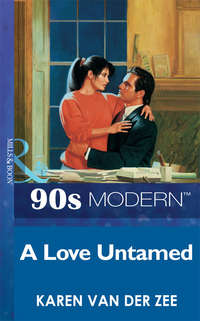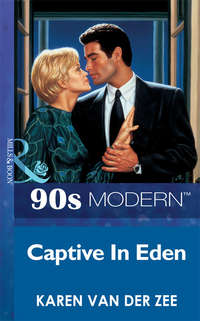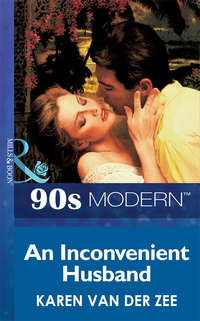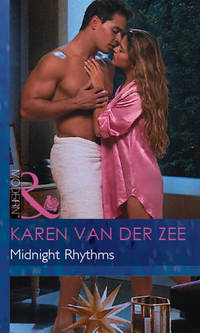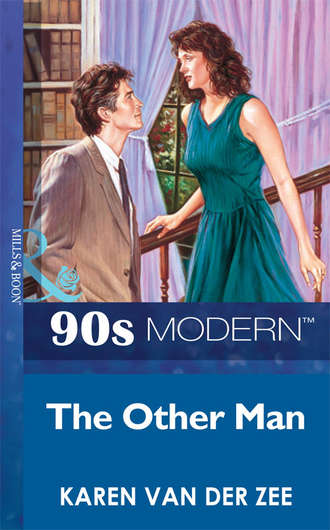
Полная версия
The Other Man
“Something wrong?” Aidan asked.
She swallowed again, glancing away at her hands, trembling in her lap, her tongue paralyzed. She shook her head.
“I need something to drink,” he went on when she remained silent. “Come on up and join me.” Matter of fact. Casual. As if she were a friend, a neighbor. Yet behind the calm words she sensed a subtle command. He was used to having his way, to be obeyed. There was a sense of authority about him that seemed more pronounced than she re-membered. It was there in the way he held his body, the enigmatic face, the cool look in his eyes.
She nodded, not sure why. One part of her wanted to run, the other part wanted to do as he suggested. Her hand trembled as she put the car into drive and turned into the path, following Aidan as he jogged up to the house. Powerful legs, broad shoulders. He was a well-constructed running ma-chine, well-proportioned. She watched the smooth movement of his muscles beneath the tanned skin of his back and legs and felt her mouth go dry. Why couldn’t she have found him wearing baggy sweats?
She parked the car by the side of the house. Aidan opened the door for her and with a sweeping gesture indicated the back door of the house that led into the kitchen. The front door was never used, she remembered, only when strangers rang the bell.
The big, eat-in kitchen had changed little. It was light and bright with casual but expensive wooden furniture and was updated with the latest appli-ances. Not your average summer cottage this was, furnished with castoffs and attic furniture. Only the best for the Carmichaels. How awed and impressed she’d been by the family’s wealth when she’d been younger. How young and unsophisticated she had been…Sometimes, looking back, it amazed her how much she had changed, how much she had matured.
The windows had a view of wooded, rugged rocks jutting out into the wide expanse of ocean. She heard the call of sea gulls and the roaring of the waves.
He stood by the sink and splashed water on his face and neck, then dried off with a flowered kitchen towel he pulled out of a drawer.
“You look different,” she said, knowing she sounded inane, saying it just to break the awkward silence.
He shrugged as he filled two tall glasses with ice and water. “So do you.”
Of course she did. She was twelve years older. And a lifetime wiser. She searched her mind to think of something else to say. “Where were you working, before coming here? Bangladesh, still?”
“No, Ecuador. I left Bangladesh three years ago.” He handed her one of the glasses.
He gulped down the entire glass of water, then refilled it. She watched his hands work the tap. Big hands capable of gentle touch. Swiftly, she forced the thought away.
He turned back to her, regarding her with un-fathomable eyes. “Why did you come here?” he asked casually, tipping back his glass and drinking more water.
The question she dreaded. “I…” She gestured helplessly, scrambling for words, for a light touch. “I suppose just out of ordinary curiosity.” She managed a breezy smile. “To see how you’d fared after all these years.”
He cocked one dark eyebrow. “Really?” A single word, a thousand hidden meanings.
She sipped at her water. “Why are you staying here?” she asked. “Vacation?”
He pushed his damp hair away from his forehead. “No. I’m here to finish a book about my research project. Then I’m going back to Ecuador.” He placed his empty glass back on the counter.
“Are you ever planning to come back home for good?”
He leaned lazily against the counter, his arms crossed in front of his chest. “Not a great need for tropical pediatrics in the temperate Northwest, is there?” Faint amusement in his voice.
She shrugged lightly. “No. But I suppose you could teach or write, or both.”
“I’d rather practice medicine, with a little writing on the side for a change of pace.”
They were having a calm, simple conversation, yet she felt shaky with tension. There was so much she wanted to say, so much to explain, but she could not find the words. Her mind seemed to have shut off, as if overloaded with emotion and stress. Then again, why would it matter to him at this point? He had the life he wanted and a wife who shared it, and the past did no longer matter. She wondered where his wife was.
“And what are you doing with yourself these days?” he asked politely.
She moistened her lips. “I’m a teacher. Kinder-garten. Five-year-olds.”
His eyes narrowed slightly. “Really?”
Had she seen a glimpse of surprise in his eyes? She nodded. “I…I love it. It’s vacation now, though, so I’m not working,” she went on, feeling ridiculously nervous, as if she were making an un-comfortable confession. “Usually I volunteer in the summer and work with special programs for mi-grant kids, but…eh, not this time.”
Why was she saying all this? Because she wanted his approval, to show him she was not merely a lady of leisure, driving a Porsche and living off her deceased husband’s money. She was a person in her own right, a person who had matured and made something of herself.
He studied her. “You look good,” he said bluntly. “You lost that scrawny look.”
To her mortification, heat rushed to her cheeks. She’d been thin at eighteen, working too many hours, eating too little food. She’d filled out a little in the past twelve years, she knew. She’d gained some weight and rounded out in all the right places.
“I’m not a teenager anymore,” she said, as if he didn’t know. Why did she have to sound so stupid?
The years of separation yawned between them. How did she bridge that gap of time—all the events and changes that had taken place in the years stretching between then and now? Was it even possible? Did she want to?
“You’re a woman now,” he agreed, his gaze sliding over her body with seeming clinical as-sessment. Hidden behind the cool gray something stirred that set off a tingling in her body.
Her heart throbbed in her throat. She swallowed painfully. “I was very young when we knew each other, Aidan.” It was more than a statement—it was a plea for his understanding.
“Eighteen.” His voice was stone hard. “Old enough to marry Marcos whatshisname.” His eyes were gunmetal gray as he stared at her with a sudden cold anger that made her heart turn over.
There was nothing she could say to that, nothing that would make any sense to him. Yet she did not want to be affected by his anger. She had come to peace with her own past and she didn’t want to be dragged back into it by his anger. Only she was, whether she wanted to or not. It was as if a storm had tipped her little boat upside down and she was hanging on for dear life, trying not to drown in the turbulent waters.
She wished she were not affected by him so. She didn’t want to feel that churning hunger inside her, that pull on her senses just being in his presence.
After all these years, it was still there—the same magnetism, the same power.
What had she hoped for? That her memories were only the feelings of an eighteen-year-old? Romanticized, idealized? That perhaps now that she would see him with the eyes of a mature, grown woman, he would somehow seem diminished, that his strength and male appeal would not seem nearly as devastating to her now as it had been before? She’d been wrong. It was still all there and more. He exuded a raw, wild sensuality that she hadn’t known or recognized before and to which she reacted in-stinctively now. Maybe it had not been there then, or maybe it took a mature woman to sense it.
In the silence she saw his face relax, take on again the look of cool detachment. He waved at a chair. “Sit down.”
She sat down. “How did you know I was married?” she asked, clasping her trembling hands in her lap.
He shrugged. “Somebody sent me the an-nouncement that was in the newspaper. I don’t re-member who.” He refilled his glass with water. “I seem to remember his name was Spanish. Mexican?”
“Yes. Marcos Silva. He was born in California, but his parents came from Mexico.”
“What did he do for a living?” He tipped his glass back and took a long swallow of water.
She watched his Adam’s apple move as he swallowed the water. “He was an architect. He de-signed private homes for people.”
He nodded. “A much better choice than I, I’m sure. Your mother must have approved.” A wealth of meaning hid behind those coolly spoken words. Hot indignation flared through her. She forced herself to stay calm.
“She never knew him.”
His brows quirked fractionally. “I see.”
No, you don’t, she almost said. No, you don’t see a thing, Aidan! She fought the impulse to ex-plain, to make him understand, but she knew it would all sound wrong and he was in no frame of mind to accept her words. Pride kept her silent.
She did not know him this way, those cold eyes, the hard mask of his face. This was not the same man she had once known—not by a long shot. So why then did he still ignite a fire in her blood? Why then did he make her heart race? He was not the open, enthusiastic young doctor she had so loved when she was young. Why then did she still feel the vibrations? Still the yearning? Was it merely a reaction to long-ago memories, rather than the present reality?
She glanced away, out the window, seeing from the corner of her eye that he pushed himself away from the counter. He came toward her, towering over her, and fear assaulted her. He was too close, too potently male, and she felt exposed and vul-nerable. He reached for her hands and pulled her to her feet. She was trembling on her legs as she looked into his face, so close, so very close. The heat of his bare chest radiated onto her arms. She felt his breath on her face, smelled the male scent of him—clean sweat, warm, damp skin, salty sea air.
Her body tingled and ached and she couldn’t find air to breathe. She wanted to put her mouth to his chest and taste him, lose herself in his nearness. No! No! She didn’t want to feel this terrible hunger, this aching need for something she’d tried for years to forget. Panic assaulted her and she fought against it. No, no!
She struggled for air as his eyes locked with hers, felt her heart slam into her ribs and then his mouth was on hers. Firm and hard and sensual. The kiss did nothing to assuage the pain, nor the panic, nothing to melt tension. It started a fire inside her— a fire fed by the still-familiar taste and smell of him, the feel of his hot mouth, his hard body pressed against her.
No! No! She fought ancient instincts, struggled against him, tore her mouth from his. Finally, he released her and stepped back. Gwen leaned against the table, trembling violently, gasping for breath.
“What…the…hell…was…that…for?” she managed on a furious tone, finding a frightening well of anger. Anger at herself for feeling the way she did now. Anger because he had no right to do this.
Anger because she was terrified. Nothing but heartache and disaster lay ahead if she allowed this to affect her.
He shrugged, a mocking slant to his mouth. “For old times’ sake.”
“Bastard,” she whispered fiercely.
The sounds of a car driving up. A door slamming. She gulped in more air, clasping the edge of the table for support, struggling for composure.
The door swung open and his wife walked in, clutching a bag of groceries to her chest.
“I’m back,” she said unnecessarily, and dumped the bag on the counter. She wore a topaz blue shirt and white shorts that showed long, lean legs. She glanced at Gwen. “Hi,” she said, and frowned. “Haven’t I seen you before? Oh, yes, the restaurant! Last night.” She glanced questioningly at Aidan, obviously waiting for an introduction.
“I’ve got to go.” Gwen didn’t know where her voice came from. Somehow she made her legs move, forced them to take her out the door and into her car.
Next thing she knew she was out on the road, driving on automatic, going too fast.
He’d had no right to kiss her, to touch her—no right at all. Anger burned inside her. And deep, hot humiliation. He had seen the emotion in her face, sensed the effect he was having on her and he’d taken advantage of it, humiliated her.
“Damn you, Aidan!” she shouted out loud, but the wind whipped away her words.
The sangria was delicious. Alice’s daughter, just back from a college semester in Spain, had made it according to a genuine, unadulterated Spanish recipe, which included generous amounts of cognac.
It was getting late, but the party was still going strong and Gwen was having a wonderful time. Her friends had outdone themselves. Flowers every-where, a pile of birthday presents, wonderful food, a huge, homemade birthday cake.
It was good to have so many friends, to have people care about her and take her seriously. When Marc had died, they’d gathered around her, helping, comforting. And now this. She smiled as she glanced around her garden where they’d all gathered to help her celebrate her thirtieth birthday.
Thirty! It sounded wonderful, as if now she really had grown up and truly was a mature woman. It wasn’t what a lot of women thought when they left their twenties, but she didn’t mind in the least. She liked it.
It was good to feel independent and secure in yourself and to know what you wanted. It was wonderful to be able to make decisions on your own and to feel confident about your choices and abilities.
She was going to sell this house. She didn’t have to ask anyone for permission. She could do it be-cause she wanted to. Because this was no longer her house. It was a place where she had spent a part of her life, a very important part, but that part was over now. Marc was dead and she was no longer a married woman.
She’d sell the Porsche, too, and buy something a little more modest and practical. She grinned to herself. It was wonderful to feel in charge of your own life, to feel so in control.
She had Marc to thank for it all. He had helped her become the person she was now. She closed her eyes for a moment as a wave of guilt washed over her. With an effort she pushed the feeling away and opened her eyes.
Aidan, entering the room from the terrace.
Her heart slammed against her ribs. Oh, God, why was he always showing up when she wasn’t expecting him? What was he doing here now? She didn’t want him here, in her house. She drew in a long breath of air, fighting for control. He’s not going to ruin the evening for me, she thought grimly. I won’t allow it.
He was coming toward her, moving with lazy grace, wearing casual trousers and an open-necked shirt. His chin was smoothly shaven, different than it had been when he had kissed her. She could feel again the roughness against her face, feel again his mouth on hers. Her heart turned over and a sense of humiliation flooded her again. Get out of my house! she wanted to call out, but the words stayed frozen in her head as she watched him approach, feeling again the old, familiar pull on her senses, and the frightening sense of having no control over them at all.
Don’t let him see how you feel! said a little voice inside her. Be cool. She straightened her spine, pulled back her shoulders, gathering strength.
“Happy birthday,” he said when he reached her. As if nothing had happened. As if he were a friendly neighbor just dropping by.
She cocked a cool brow. “How did you know?” Her voice was steady. She took a careful sip from her sangria and tried to look relaxed. It took a ter-rible effort.
He shrugged lightly. “It’s the last day of June. I happened to remember, so I thought I’d stop by to congratulate you. After all, thirty years is a milestone. Are you depressed?”
“Heavens, no,” she said breezily. “As a matter of fact, I’m delighted.”
He surveyed her face for a moment, as if to verify the truth of what she said. “My sister had a nervous breakdown,” he said then. “Thought her life was over.” A hint of humor, barely perceptible, colored his voice. His eyes did not leave her face.
“Mine’s just beginning.” She smiled brightly.
His brows rose in question. “How’s that?”
“Well, let’s say I’ve finally come into my own. I feel good about myself.” She felt a surge of new courage and looked at him squarely. She knew a yearning for him to understand, to know. “I’m standing on my own two feet and I like the feeling.” She twirled on her toes as if to demonstrate, her long silky skirt swirling around her ankles. She would not let him spoil her mood. She felt happy surrounded by friends and good cheer.
“Admirable,” he said evenly.
“Have a drink,” she offered. “We have sangria. The genuine article, straight from Spain. The recipe, that is.”
He put his hands in his pockets. “No thanks, too sweet for me.”
She gestured at the terrace outside. “The bar is over there, get what you want.”
“An impressive spread,” he commented, looking at the tableful of food—marinated shrimp, French country pate, a selection of exotic cheeses.
“I have lots of friends.” She smiled brightly. “They did most of it.”
Surprise flitted across his features. Gwen knew what he was thinking. Lots of friends. She hadn’t had lots of friends when she was younger. She’d been a loner then, shy and insecure, living with her mother in a ramshackle little house at the edge of town. All of that had changed.
He glanced around. “Quite a place,” he com-mented. “You did well for yourself.” Just a comment, a simple statement of fact, yet she sensed more than heard the contempt behind the words. Was she imagining it?
There was no reason to feel on the defensive, yet she felt herself tense, she couldn’t help it. “Yes, I did,” she said flatly, forcing herself to look straight into his eyes. There was nothing there. Nothing but cool, impersonal gray.
The silence throbbed, and suddenly, deep inside that still gray of his eyes she glimpsed something deeper—a dark shadow trying to hide—not anger, not contempt, something else.
He took one of his hands out of his pocket and absently stroked the back of the leather sofa. “I’ve wondered at times,” he said casually, “if you had what you wanted.”
Pain. Deep and sharp. She fought not to show him, taking a slow drink from her glass. Her eyes met with his as if drawn together like magnets. Her tongue wouldn’t move.
“Did you?” he insisted. “Did you have what you wanted?”
“I was very lucky,” she managed, her voice husky. “And I understand you did very well for yourself, too, according to what I’ve read,” she added in a desperate attempt to get away from his line of questioning. “You’re doing wonderful work, important work. It’s what you always wanted to do, isn’t it?”
“Right.” His tone was cool, clipped, businesslike.
Something else had changed about him, she realized. There was a stillness about him—in the way he spoke, in the way he moved. Once there had been a restless energy in him, an enthusiasm that caused bright silver sparks in his eyes when he spoke.
From the corner of her eye, she noticed Joe sauntering up to them, his sleek black hair tied back in its usual ponytail. Smiling his warm smile, he draped a protective arm around her. Joe to the rescue, she thought, feeling warm with gratitude and relief. She glanced back at Aidan, seeing his eyes narrowing a fraction.
“Aidan, this is Joe Martinez. Joe, Aidan Carmichael.” They shook hands, Aidan’s face pol-itely bland, Joe’s brown eyes darkly suspicious. He wore his standard garb of jeans and a loose, torrid silk shirt. His cowboy boots were well-worn and well-polished. Next to Aidan in his conservatively casual clothes, he looked rather eccentric.
She slipped out from under Joe’s arm. “Excuse me,” she murmured, and escaped to her other guests. It was getting late and they were beginning to leave, giving her hugs and smiles and thank-yous which she returned with warmth.
Half an hour later, Joe came up to her. “He’s still here. Do you want me to stay?”
She’d been watching Aidan as he’d moved around, exploring the room, not mingling much. He’d studied the Mexican paintings in the living room, stared at the sky outside and he’d perused the books on the shelves.
“He’s been looking bored. He’ll leave soon.” She smiled. “You worry too much about me, Joe.” Joe had been Marc’s best friend and he was looking after her.
“I don’t like the looks of the guy.” He frowned. “Who is he?”
She waved her hand casually. “Somebody I knew, a long time ago.”
He looked at her searchingly. “I think there’s more to it than that.”
She bit her lip. “He wanted to marry me, before I met Marc.”
“And you didn’t want to marry him?”
She hesitated. Her light, frothy mood was de-serting her. “I was scared.” Just the memory of that primitive, ancient fear made her hands clammy even now, twelve years later. She remembered the nightmares, felt again the dark sense of foreboding she had not been able to shake. I can’t go. Some-thing terrible is going to happen.
Something terrible had.
Joe frowned at her. “Scared? Were you scared of him?”
“No, no. Please, Joe, I can’t go into this now.”
He took her hand. “You know, Gwen, I’m here for you. If you need me, let me know, will you?”
She felt a lump in her throat. “I will, Joe. You know I will.”
A while later she found herself alone in the silent house. Everyone had gone home and there was no sign of Aidan. He’d left without saying goodnight. She shrugged, feeling relieved that he was gone.
Kicking off her shoes, she sank down on the large Italian sofa and gave a deep, contented sigh. She didn’t even have to clean up—it had all been done. All she needed to do was lock up, peek in on Churi, and crawl into bed. She closed her eyes, feeling for the first time how tired she was.
She heard the wind rustle in the trees outside, the cacophony of insects thrilling in the cool night air. Very peaceful. Then she heard footsteps out on the terrace and she froze.
“Gwen?” Aidan’s voice.
She bolted upright. “What are you doing here?” Her voice was sharp, out of control.
He shrugged, hands in his pockets. He advanced into the room. “I took a walk—it was a little longer than I intended. Everybody gone?”
She came to her feet. “Yes.”
“Your bodyguard, too?” A faint note of amusement. She didn’t like it, but she couldn’t think of a good retort, so she said nothing and just gave him a cool look.
He glanced down at the small table at the end of the sofa and studied the grouping of photographs arranged on it. She and Marc on a sailing boat, laughing, the wind in their hair. She and Marc sitting on a picnic bench, heads together conspir-atorially, his arm around her shoulders. Their wedding picture, both of them smiling. Joe had taken every one of them—beautiful photos, catching just the right expressions, just the right moods.
The air throbbed with tension. Her stomach churned with anxiety as she looked at Aidan’s rigid posture.
“You were happy,” he stated, a harsh edge to his voice, as if it were an accusation.
She swallowed painfully, her eyes on the photos, fighting a confusion of feelings—a struggle that knotted her stomach and made her chest hurt. The photos blurred in front of her and she clenched her hands into fists. She blinked her eyes, trying to focus on Marc’s face, but it was useless. Then she lifted her face to Aidan and met his eyes.
“Yes,” she said.
He studied her for a tense moment, taking in the red party dress, his eyes coolly disdainful. “You don’t look like a grieving widow to me.”
The words hit her like a fist in her chest, then fury flooded her. How dare he? How dare he judge her? She wanted to say something back, something sharp and damaging, but words failed her. The silence echoed with his voice, and the fury mixed itself with guilt, a toxic mixture that lodged itself in her throat, making her wild with a need to lash out.
Then a cry, a frightened cry coming from up-stairs. All thought of Aidan, of anger and revenge evaporated. Her body moved instantly, racing up the curving stairs to Churi’s room. She lifted the baby out of her crib and hugged her. “It’s all right,” she whispered. “It’s all right, sweetheart. Let’s go have some milk.”



